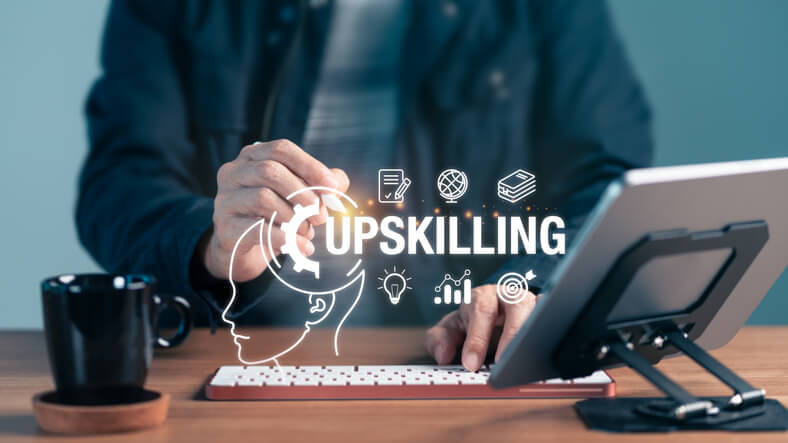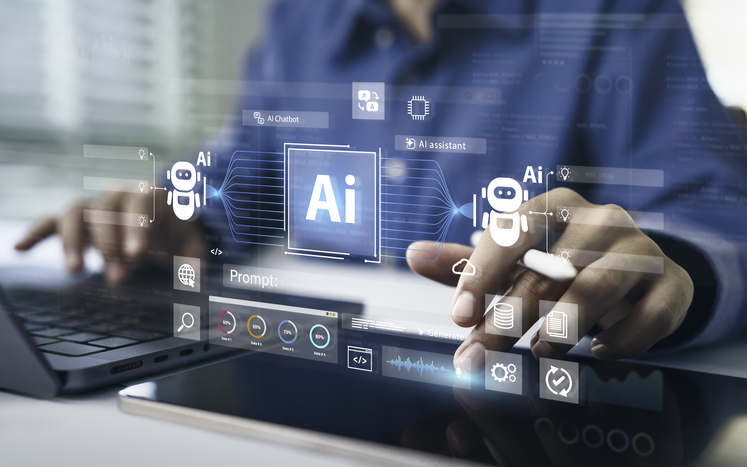
Compare Providers
Download our outplacement comparison sheet
Request Pricing
Compare our rates to other providers
Workers across industries face a common question: How do you keep skills relevant in the age of artificial intelligence (AI) and rapid automation? The answer, increasingly, comes from inside organizations themselves, as more companies invest in upskilling employees.
Many leading companies are investing heavily in helping employees adapt, grow, and future-proof their careers. Some organizations are even investing in upskilling and reskilling individuals outside of their workforces, with the belief that everyone—including companies themselves—will benefit from a better prepared society in the future.
So why are companies upskilling? Beyond filling immediate skill gaps, these initiatives help organizations retain talent, build stronger cultures, and prepare their workforce for the jobs of tomorrow. In this article, we highlight five of the top companies that are upskilling employees in 2025.
The Benefits of Upskilling for Employers and Staff
Upskilling delivers a dual return: stronger businesses and more empowered employees. For organizations, it addresses widening skill gaps, enhances productivity, and builds a more adaptable workforce. For employees, it creates career mobility, increases confidence in navigating technological shifts, and ensures long-term employability.
Companies that commit to developing their people also see higher engagement and retention. Workers are more motivated to stay when they feel invested in and can clearly see pathways for growth. At the same time, employers reduce hiring costs and foster resilience in the face of automation and digital transformation.
STATISTICAL INSIGHTS:
According to a 2023 study by the World Economic Forum, 44% of companies expected to face skill gaps within five years, and 43% already reported existing gaps.
The same report states that 85 million jobs risk being displaced by automation by 2025. However, 97 million new jobs could emerge for the same reason—indicating the need for workers everywhere to be better equipped to explore new technologies.
Ready to invest in the growth and development of your employees? Click below to connect with Careerminds experts and discover how our approach to career frameworks can help you elevate your entire workforce.
Top 5 Companies Investing in Upskilling
Now, let’s explore the top five companies that are making the most impressive investments in upskilling in 2025.
1. Microsoft: Elevating AI Skills at Scale
For decades, Microsoft has been one of the world’s largest software companies. Its platforms power everything from enterprise systems to personal computing, cloud services, and AI. Its influence stretches across the global economy, making its workforce strategies a global model.
In July 2025, Microsoft unveiled Microsoft Elevate, a $4 billion initiative focused on AI skilling and digital readiness for individuals worldwide. At the core of this is the Elevate Academy, which aims to credential 20 million people in AI within two years. Microsoft is collaborating with LinkedIn Learning, GitHub, and Code.org to deliver training content that ranges from AI basics for non-technical learners to advanced courses in machine learning and data science.
Beyond technical courses, Microsoft Elevate emphasizes digital equity by partnering with nonprofits, labor organizations, and schools to empower underrepresented communities. When AI literacy is embedded into secondary schools, community colleges, and nonprofit programs, Microsoft’s employees will be better prepared, as well as the wider labor force.
For Microsoft, this initiative expands its global AI ecosystem, fueling the adoption of tools such as Azure AI and Microsoft 365. By creating millions of AI-trained workers, Microsoft ensures that its platforms become central to innovation and builds a reputation as a socially responsible tech leader.
EXPERT QUOTE:
“AI is a powerful tool that can help us learn and be more productive. But as with any tool, it needs to be used in the right ways and with a broad perspective,” said Microsoft’s vice chair and president, Brad Smith, when launching the Microsoft Elevate program.
“Ultimately, the conversation about AI and jobs must begin with people—not just productivity… The goal isn’t to build machines that replace us—it’s to build machines that help us do more and do it better.”
2. Amazon: Building Career Pathways for Hundreds of Thousands
Amazon is the world’s largest retail company and a global powerhouse in logistics and cloud services. With more than 1.5 million employees worldwide, its workforce development investments have the potential to shape entire labor markets across the five continents.
Since launching its upskilling 2025 pledge in 2019, Amazon has invested over $1.2 billion in free skills training, reaching more than 350,000 US employees and over 700,000 globally.
Amazon’s upskilling programs are diverse and highly targeted:
- Career Choice: Amazon prepays tuition for degrees and certifications. Since 2012, over 110,000 employees in 14 countries have completed training in fields such as aircraft mechanics, nursing, and commercial trucking.
- AWS Training and Certification: More than 600 free digital courses on cloud computing, AI, and machine learning. These courses are available to both employees and the public, expanding the AWS (Amazon Web Services) customer base.
- Machine Learning University: For employees with coding backgrounds, this internal university provides advanced ML and AI training to support Amazon’s innovation goals.
- Mechatronics and Robotics Apprenticeship: This program prepares hourly employees for careers in robotics and automation, often resulting in wage increases of up to 40%.
- Amazon Technical Apprenticeship: Supporting veterans and career changers as they train for roles like cloud support associate and software development engineer.
With these programs, Amazon gains a future-ready workforce that can keep up with automation in logistics and robotics. The organization can also cultivate loyalty among employees who see a clear path to higher-paying jobs. For AWS, widespread training creates a larger pool of certified professionals, strengthening Amazon’s dominance in cloud services.
3. Walmart: A $1 Billion Skills-First Transformation
As the world’s largest private employer, Walmart’s workforce strategy has a profound impact on the global economy. With over 2 million associates, the company is uniquely positioned to model what a skills-first approach looks like at scale.
In 2025, Walmart announced a $1 billion skills-first investment in career-driven training and education through its Walmart Academy and Live Better U programs. More than 75% of Walmart’s US roles no longer require a college degree, reflecting a deliberate shift away from credentials and toward demonstrated skills.
Here are Walmart’s key skills-first initiatives:
- Walmart Academy: The largest private training program in the US, providing immersive, role-specific learning with VR, on-the-job coaching, and leadership training. Over the next few years, the Academy will expand to help fill 100,000 in-demand jobs, such as truck drivers, pharmacy technicians, and HVAC specialists.
- Live Better U: A tuition-free education benefit that has already saved associates over $730 million. Employees can earn short-form certificates, degrees, and professional credentials with no out-of-pocket cost.
- Skills-First Workforce Initiative: A partnership with the Burning Glass Institute and other large employers to create a national framework for skills-based hiring. This collaboration covers 12 million US jobs in its first project and aims to standardize how skills are recognized across industries.
- Walmart.org Partnerships: Through its philanthropic arm, Walmart has invested over $140 million in the last five years and an additional $25 million over two years to support frontline worker mobility and skills-based initiatives in states like Arkansas, Alabama, and Colorado.
This skills-first model offers clear advantages for Walmart, like being able to tap into a broader, more diverse workforce. At the same time, associates now have a clearer pathway from frontline roles into higher-paying careers, driving retention in an industry known for high turnover.
This approach also helps Walmart solve a structural challenge in the labor market: Many talented workers are excluded by degree requirements, even though they possess the skills needed. By leading the skills-first conversation nationally—including hosting its first Opportunity Summit in 2024—Walmart positions itself at the forefront of equitable workforce development.
4. McDonald’s: Lifelong Growth Beyond Fast-Food
McDonald’s is one of the world’s largest employers, and also the first workplace for many young people everywhere. For that reason, its training and upskilling programs have a unique impact on building the skills of the global workforce.
Through its Archways to Opportunity initiative, McDonald’s has supported more than 60,000 employees in education programs since 2015, investing nearly $125 million in tuition assistance.
McDonald’s programs include:
- English Under the Arches: Free English language classes for non-native speakers, with more than 7,600 graduates. McDonald’s highlights the success story of Lea, a manager in Honolulu who gained fluency through the program, allowing her to better communicate with her crew and earn a promotion.
- Archways Tuition Assistance: More than 45,000 employees have accessed financial support for high school diplomas and college degrees. A real-world example is Alfreda, who earned a high school diploma with McDonald’s help and is now enrolled in college.
- Hamburger University: A renowned management training program where employees learn leadership, operations, and culture, preparing them for management or corporate roles. Alumni include franchise owners and corporate executives.
These initiatives transform jobs often seen as temporary into true career paths. Employees gain transferable skills in leadership, teamwork, and responsibility, while the company reduces turnover and ensures a steady pipeline of talent for both restaurants and corporate roles. It also strengthens McDonald’s reputation as a people-first employer in a high-turnover industry.
5. IKEA: Embedding AI Literacy Across the Workforce
IKEA is the world’s largest furniture retailer, employing 170,000 people across 31 markets. Known for its people-centric culture, IKEA is now at the forefront of digital transformation by embedding AI literacy across its workforce.
Launched in 2024, IKEA’s AI literacy initiative aims to train 30,000 employees and 500 leaders on how to master AI tools responsibly.
Key elements of IKEA’s program include:
- AI Fundamentals: A baseline course for all employees to build confidence with AI applications.
- Specialized programs: Courses such as Responsible AI, Mastering Gen AI, and Algorithmic Training for Ethics to ensure that technology use aligns with IKEA’s values.
- AI Exploration Days: Leadership-focused sessions connecting AI capabilities with IKEA’s business priorities.
- Hej Copilot: A generative AI tool co-developed with Microsoft that assists workers in tasks ranging from creative ideation to presentation building.
- Accelerator Programme: A track for advanced talent with a master’s or PhD in machine learning to help IKEA attract and retain top technical talent.
IKEA ensures that its workforce remains digitally confident and able to adapt to technological disruption. Employees gain valuable AI skills that increase productivity and reduce repetitive work, while the company boosts efficiency, creativity, and innovation. IKEA is also positioning itself as a global leader in responsible AI adoption by embedding digital ethics into its philosophy.
Upskilling Companies: Final Thoughts
The scope of the initiatives described here and the weight of the companies leading them prove one thing: Upskilling is a winning strategy. When you see five global giants investing so many resources into those programs, it becomes clear that developing your workforce is a necessity for business competitiveness and employee retention.
If you’re an HR leader, follow the lead of these companies and build upskilling programs that prepare your workforce for tomorrow’s challenges today.
If you need help elevating your workforce development, engagement, and retention even further, click below to connect with our experts and learn about our career frameworks, talent development, and leadership coaching solutions.
In need of outplacement assistance?
At Careerminds, we care about people first. That’s why we offer personalized talent management solutions for every level at lower costs, globally.




